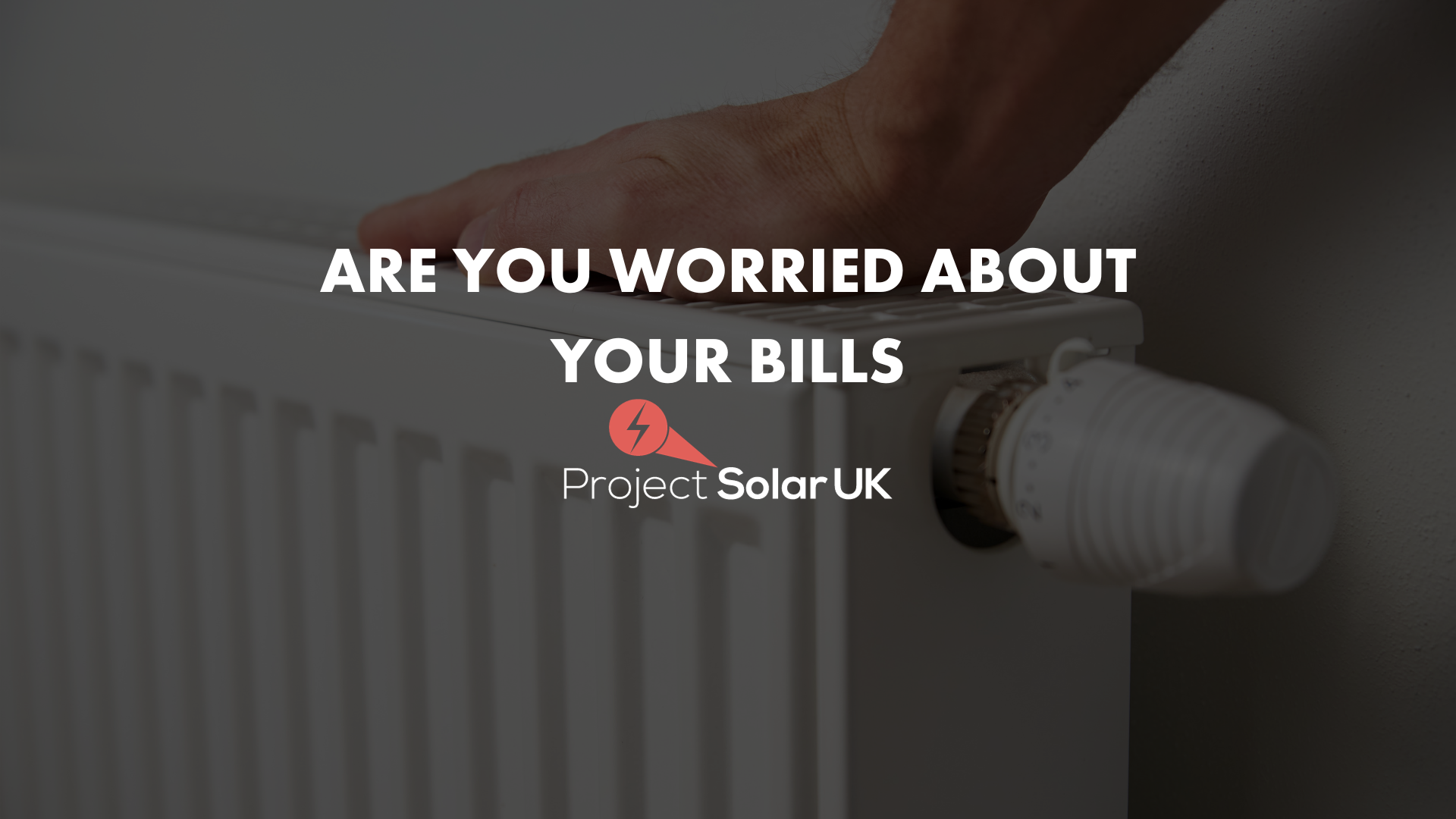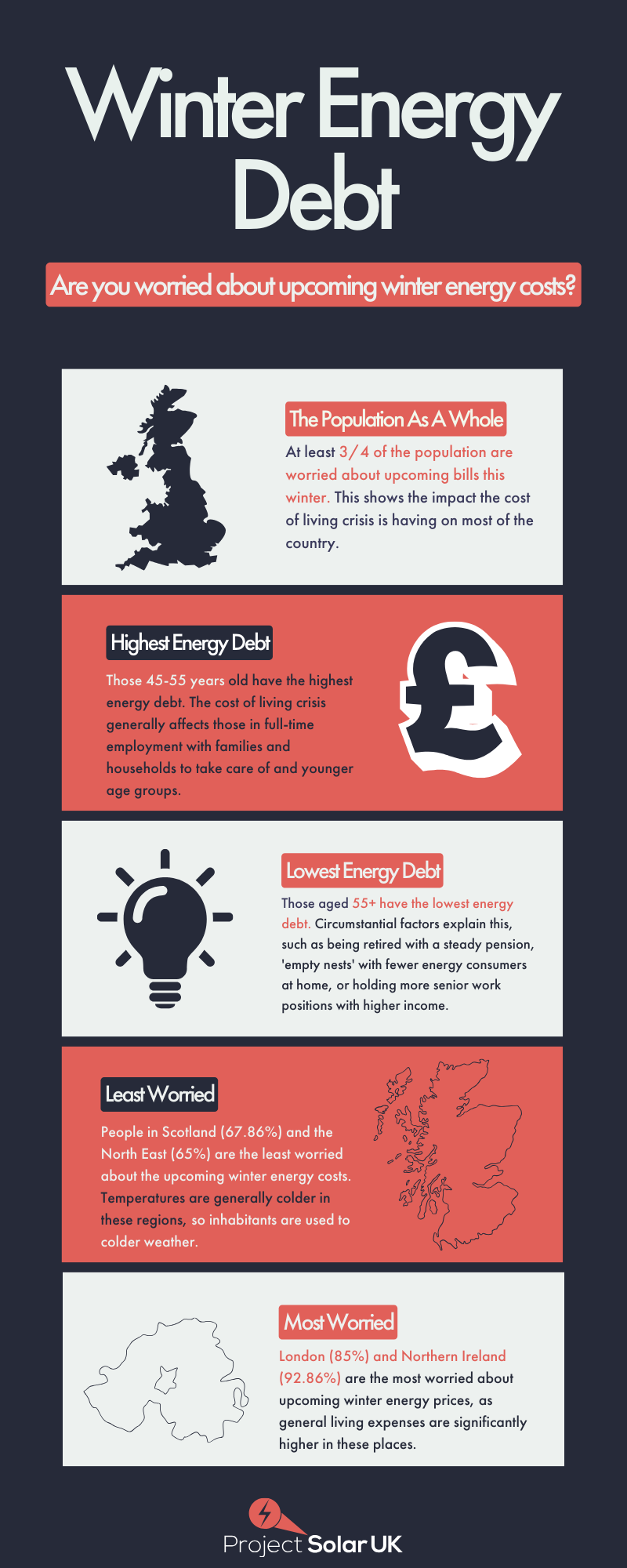
Winter Energy Debt: Are You Worried About Your Bills?
With winter just around the corner, the days are getting shorter, the air is getting crisper and soon enough it will be time to start optimising energy usage.
However, despite the wholesale costs of energy coming down, the associated costs of increased usage of domestic appliances and central heating in the winter continues to be a source of anxiety for many.
The elevated cost of energy bills over the last year, and the consequent financial strain on many households, has left many wondering whether they can even afford to turn on the heating anymore.
Conscious of these concerns, we recently carried out a survey to find out just how much of an impact higher energy bills are having on the British public.
Based on the results of this survey, and to assist you in your preparations for winter, we have prepared this quick guide with tips and cost-effective ways to keep your home warm. We hope it will help you to reduce your energy bills in the colder months.
What Our Survey Reveals About Energy Debt
‘Energy Debt’ refers to the negative economic impact currently felt by many as a direct result of fluctuating energy bill prices over the last few months.
Of 1,000 Brits surveyed from all parts of the UK, almost two-thirds (62%) of respondents have struggled financially as a knock-on ‘energy debt’ effect from last winter’s increased energy bills.
76% of those who expressed concern were particularly worried about energy bills and upcoming energy costs this winter, not wishing to experience further economic strain in the coming months.
You can take a look at a summary of the results from this survey in the infographic below.

Top Energy-Saving Tips for Colder Months
Our survey revealed that many respondents already took practical steps to keep the cold out and energy bills down last winter. Inspired by this, we’re sharing some of those ideas as well as our own tips to help you reduce your energy bills in the coming months.
Change Your Duvets
According to our survey, almost half (45%) of the respondents already keep the winter chill at bay by upgrading their duvet from a lighter tog rating to one more adequate for cold weather.
Something as simple as using a heavier duvet can reduce the necessity to turn the heating on, and reduce energy bills as a consequence. Doubling up on thinner duvets and adding extra blankets to your bed can achieve a similar effect.
Instead of keeping the heating on all night, you can put it on before going to bed to warm up the room, and then the duvet and blankets will lock the heat in during the rest of the night.
Stock Up On Hot Water Bottles
Another great tip if you are worried about your energy bills is to warm up using hot water bottles.
Putting a hot water bottle between your sheets before bedtime can be a simple and effective way to warm up your bedsheets before going to sleep. Having a hot water bottle to hand during the day can also be a good way to quickly warm up without having to reach for the central heating dial.
Bleed Your Radiators
Bleeding your radiators regularly is a surprisingly effective way to keep bills down.
Our survey revealed that 37% of respondents make bleeding their radiators a part of their regular routine to ensure that the central heating is working efficiently before winter sets in. If you have never bled your radiators before, it’s a great skill to know, particularly if you are worried about your energy bills.
Radiators source hot water from pipes connected to your boiler and then conduct that heat through your home. During their use, radiators can develop small air bubbles within their pipes. These air bubbles obstruct the flow of hot water, impeding the effectiveness – and cost-efficiency – of your heating system.
Bleeding your radiators prevents those obstructive air bubbles building up. Doing so is simple and only takes a few minutes per room.
Here’s a step-by-step guide on how to go about it:
1. Turn your heating off and double-check that your radiators are cold.
2. Find the bleed valve of your radiator – this looks like a small metal square inside a round nut, usually at the top of your radiator. You should have a bleed key which fits inside this valve. Insert the key, and hold a jug or a mug below the valve to catch any water that escapes.
3. Turn the key anti-clockwise until air starts escaping. You’ll hear your radiator start to hiss; don’t worry, this is normal.
4. When water starts to come out of the valve, that’s how you’ll know all the air is out of the system. Turn the key clockwise to re-tighten the valve and remove it.
5. Go through the same process with all of your other radiators before making your way back to the boiler.
6. Turn your heating back on and make sure your radiators are now all heating up correctly.
Draught-proofing
Another way to help lower the costs of heating your home this winter is to make sure that it is fully draught-proof. According to the results of our survey, 22% of you are already taking steps to do exactly this.
You can generally tell if there is a draught in your home, as you will notice that some rooms are colder than others. However, sometimes there are less obvious draughts and gaps allowing heat to escape and cold air to come in.
Our survey revealed that 17% of respondents undertake regular insulation checks to make sure no unwanted draughts are coming in to their homes. This is a highly-recommended practice, as adequate insulation can make a real difference to the temperature of your home. Even checking and repairing roof issues and loose tiles can have a big influence on how warm your home is, as 12% of our survey respondents already know.
For shorter-term solutions, try using a draught excluder or even spare blankets to prevent cold breezes from entering under doors.
Another trick to keep the heat in any room is to open the curtains during the day to let the sunlight heat up the room. As night falls, close the curtains to seal the heat inside.
Layer Up
Perhaps the simplest of all of the tips we’ve listed is to layer up on clothes while at home. Wearing jumpers and thick woolly pyjamas in the house will keep you warm on even the coldest days.
Making sure you’re appropriately dressed for the weather when you go out can also ensure that you don’t catch a chill and feel the need to turn the heating on the moment you get home.
Be Strategic with Central Heating Use
Using the central heating in a more strategic way is one of the most efficient ways to heat your home without racking up steep energy bills.
If you are only inhabiting one or two rooms during the day, there is no need to have the heating on in every room in the house. If you are not using the bedrooms during the day, for example, turn the radiators off in those rooms. By doing so, you could make significant savings on your energy bill, not to mention do your bit for the environment.
Think about what times of day you will need to heat up certain rooms, and for how long. It may not be necessary to heat the living room all evening. Heating it for half an hour when you get back from work could be sufficient to keep you warm for a few hours. The same is true for the bedrooms – warming them for half an hour before retiring for the night could be enough to keep you warm the rest of the night.
Another useful tip is to keep your boiler in frost protection mode and to get your boiler regularly serviced – we discovered that 34% of you are already doing so. These tips effectively prevent pipes from bursting. After all, no one wants to spend Christmas without hot water and heating while waiting for the plumber to arrive.
Install Solar Panels
When we surveyed the British public, we found out that 7% of respondents had taken the decision to install solar panels as a means to reducing energy bills in the winter months.
Contrary to common misconception, solar panels don’t depend on extremely sunny weather conditions to function efficiently, and could indeed be a more-long term solution to energy debt.
By harnessing the power of the sun, no matter the weather conditions, you could reduce your reliance on traditional energy sources.
Using solar panels to complement energy sourced through the grid, you could begin to power some of your domestic appliances and devices using the solar power that you’ve saved. You may even be able to sell excess solar energy you’ve generated back to the National Grid, giving you greater control over your finances.
With the help of a smart meter, you can also monitor how much energy your solar panels are generating. Keeping tabs on peak energy hours and how much energy is needed to run your appliances is particularly useful in helping you to develop an awareness of how and when to use energy in your home.
In turn, making those savings over the months and years could afford you greater freedom from financial anxiety. In fact, a quarter of our survey respondents who had installed solar panels were not concerned at all about their energy expenses for the coming winter.
It’s easy to see why solar panels are a truly worthwhile investment, as they can offer greater independence from the National Grid and have the potential to reduce energy bills, all while sustainably contributing to a greener future.
If you’re worried about your energy bills or are thinking of installing solar panels, contact us today.



